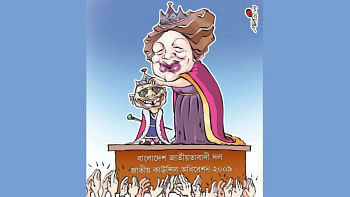Mueen the man
An eyewitness yesterday said Chowdhury Mueen Uddin had direct access to the torture centre of Al-Badr force at Mohammadpur Physical Training Centre during the Liberation War.
Even the militia men, guarding the torture centre, stood in attention when Mueen, an alleged Al-Badr leader, went in and out, ANM Golam Rahman Dulu told the International Crimes Tribunal-2.
Dulu, the younger brother of martyred journalist ANM Golam Mostafa, said Mueen was a colleague of his brother at Bangla daily Purbadesh.
Dulu, who witnessed his bother's abduction by the Al-Badr, said he learnt from Purbadesh employees and newspaper reports that Mueen was the key person behind his brother's abduction and killing. He even faked a search for Mostafa, Dulu said.
Dulu, as the eighth prosecution witness in the war crimes case against “absconding Al-Badr leaders” Mueen Uddin and Ashrafuzzaman Khan, gave a heart-wrenching description of how Al-Badr men abducted his brother from their home on December 11, 1971.
He spoke of their search for him and what his death had done to the family.
“My father got bed-ridden after my brother was abducted by Al-Badr and he couldn't stand up since. He died in September, 1973,” said emotion-chocked Dulu appealing for justice for the killing of his brother and other intellectuals.
During his one-and-a-half-hours testimony, the 65-year-old said his elder brother Mostafa was a senior journalist and literary editor of Purbadesh. He also worked for Sangbad and Azad and was involved in left-wing politics.
“My brother used to write for the liberation movement, and for this he had an ideological rivalry with Chowdhury Mueen Uddin, who was a staff reporter of Purbadesh,” said Dulu, now an employee at a private firm.
Around 6:00am on December 11, 1971, a group of Al-Badr men and militia men went to their Gopibagh home. Mostafa had opened the door, said Dulu adding that two to three of them were masked.
Making sure that he was indeed Mostafa, they took his brother away saying that he would be taken to the Purbadesh office and let go within a short time, he said.
Dulu said he went to the Purbadesh office around 8:30am, as his brother had not returned. He informed Atiqur Rahman, a senior staff reporter, of the matter, who in turn appraised then news editor Ehtesham Haydar Chowdhury.
At the office, Dulu learnt that the Al-Badr had also abducted journalists Serajuddin Hossain and Syed Nazmul Haque in similar fashion.
News editor Ehtesham then called editor of the paper Mahbubul Haque over the phone in Dulu's presence. Dulu said over the phone Ehtesham told the editor, “Chowdhury Mueen Uddin had done all these …”
Dulu said it was the first time he had ever heard of Chowdhury Mueen Uddin.
Ehtesham then asked Atiqur to call in Mueen and when Mueen Uddin showed up within half an hour, he was asked to take Dulu with him and look for Mostafa.
“Being sceptical, Atiq Bhai said, 'what is the necessity of Dulu going with [Mueen Uddin]'. I think Atiq Bhai didn't want me in any danger,” said Dulu adding that he went with Mueen.
Mueen and Dulu went to a building at Purana Paltan on a rickshaw. Keeping Dulu outside, Mueen went inside the building, which was the office Islami Chhatra Sangha, the then student wing of Jamaat-e-Islami.
According to prosecution documents and a few tribunal verdicts, Islami Chhatra Sangha virtually turned into Al-Badr and got involved in numerous crimes, including the planned killing of intellectuals.
Mueen came out and said he had not found Mostafa there. He said the same coming out of Ramna Police Station where they went later on.
“We had information that detainees were kept and tortured at Mohammadpur Physical Training Centre and as I requested Mueen to go there, he hesitated but eventually agreed [to go there],” said Dulu.
Dulu was again kept waiting outside as Mueen entered the training centre, historically known as the headquarters of Al-Badr. Guards stood in attention for Mueen as he went in, said Dulu.
Before going in, Mueen talked to a guard their and from their conversation Dulu first heard of Ashrafuzzaman.
Mueen went in and returned 15-20 minutes later. Mueen claimed to have not found Mostafa. The guards again stood in attention as he exited through the gate, Dulu said.
After that Mueen left Dulu and Dulu returned to the Purbadesh office, where he narrated everything to Atiqur Rahman.
From Atiqur, Dulu learnt that a week ago Mostafa was involved in an altercation with Mueen over the Liberation War and Jamaat's role. Mueen had threatened Mostafa of dire consequences during the heated exchange of words, Atiqur told Dulu.
After victory in the war, Dulu and his family searched for Mostafa's body in Rayerbazar and other killing fields in Dhaka but could not find it, said Dulu.
Dulu said Mueen went into hiding after victory and Purbadesh published Mueen and Ashrafuzzaman Khan's photos mentioning them as the masterminds of the intellectual killings.
In February, 1972, Dulu joined Purbadesh and after getting information about Mueen from his colleagues, he realised that Mueen had faked the search for Mostafa with him.
State-appointed defence counsels Abdus Shukur Khan and Salma Hai Tuny cross-examined Dulu yesterday.
The tribunal allowed three more witnesses for the prosecution following a petition.

 For all latest news, follow The Daily Star's Google News channel.
For all latest news, follow The Daily Star's Google News channel. 



Comments